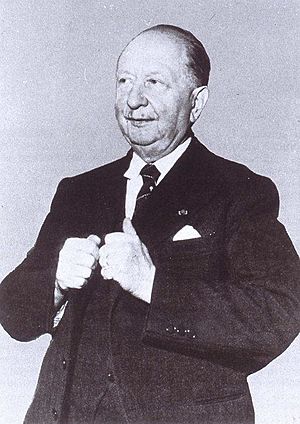Lucien Febvre facts for kids
Quick facts for kids
Lucien Febvre
|
|
|---|---|

Lucien Febvre
|
|
| Born | 22 July 1878 Nancy, Meurthe-et-Moselle, France
|
| Died | 11 September 1956 (aged 78) Saint-Amour, France
|
| Nationality | French |
| Occupation | Historian |
| Known for | Establishing Annales School |
Lucien Paul Victor Febvre (born July 22, 1878 – died September 11, 1956) was a French historian. He is famous for helping to start the Annales School of history. He also helped edit the Encyclopédie française.
Contents
Lucien Febvre's Life Story
Lucien Febvre grew up in Nancy, France. His father was a philologist, which means he studied old languages and texts. This greatly influenced Lucien's way of thinking.
When he was 20, Febvre went to Paris to study at the École Normale Supérieure. From 1899 to 1902, he focused on history and geography. After college, Febvre taught at a school called a lycée. There, he worked on his main project about Philip II of Spain and the Franche-Comté region.
In 1914, World War I started, and Febvre had to leave teaching to join the army for four years. After the war, in 1919, he started working at the University of Strasbourg. There, he met Marc Bloch. They shared similar ideas about history and politics, which made them good friends.
Febvre's time in Paris really changed his views. He was very interested in new ideas in art, philosophy, and modern thinking. He felt that he became "untuned" from old ways of thinking.
Febvre believed that history was more than just a list of facts. He thought it was important to understand the geography, people's minds, and culture of the time when events happened.
Febvre's Early Historical Work
Febvre's first big project, published in 1911, was about Philip the Second and the Franche-Comté region. In this work, he showed how important it was to understand the background of events.
He described the lives of people in a small French province. He looked at the rivers, salt mines, and vineyards to show what life was really like. This way of studying history is called histoire totale. It means looking at the "total history" of a place. This idea later became a key part of the "Annales School" of history.
Another important work by Febvre was about Protestantism, published in 1929. He studied how people practiced religion by looking at human behavior. He gathered information from many monasteries and chapels. He wanted to see how new ideas influenced religion and how religious leaders shared their views. This work got him involved in ethnology, which is the study of human behavior and cultures.
Over time, Febvre became less interested in traditional religious ideas. He believed that old ways of thinking could be dangerous in modern times. He felt that people needed to be educated to avoid these dangers.
The Annales Journal
In 1929, Lucien Febvre and his friend Marc Bloch started a scholarly journal called Annales d'histoire économique et sociale. This journal gave its name to their special style of history.
The Annales journal followed Febvre's new approach to history. It aimed to teach people about the problems of old ways of thinking. It wanted to help prevent future economic and political problems. The journal encouraged academics to "study the present to understand the past better." It was very different from other scholarly journals at the time.
The Annales was very popular and successful at first. It was so in demand that it started publishing more often in 1932. However, by 1938, its publishers stopped supporting it.
Febvre's Later Life and Legacy
In 1933, Febvre became a professor at the Collège de France. He continued to publish many works in the 1930s and early 1940s. World War II interrupted his work.
In June 1944, his friend Marc Bloch was executed. Febvre then took on the role of carrying the Annales ideas forward after the war. He trained other historians, like Fernand Braudel. He also helped start the VI section of the École Pratique des Hautes Etudes, which later became the École des Hautes Études en Sciences Sociales (EHESS).
Lucien Febvre passed away in 1956 in Saint-Amour, France. A college and a street in Saint-Amour are named after him. He is also honored with street names in Besancon and Strasbourg.
Works by Lucien Febvre
- A Geographical Introduction to History. (1922)
- Martin Luther, A Destiny. (1928)
- Une Question Mal Posée, (1929)
- The Rhine: Problems of History and Economics (1935)
- The Problem of Unbelief in the Sixteenth Century: The Religion of Rabelais. (1937)
- The Coming of the Book: The Impact of Printing 1450–1800, co-written with Henri-Jean Martin. (1958)
- A New Kind of History (selected essays) (1973).
See also
 In Spanish: Lucien Febvre para niños
In Spanish: Lucien Febvre para niños
 | Mary Eliza Mahoney |
 | Susie King Taylor |
 | Ida Gray |
 | Eliza Ann Grier |

